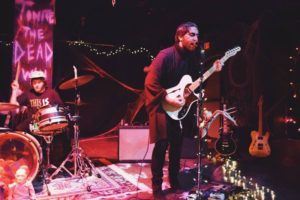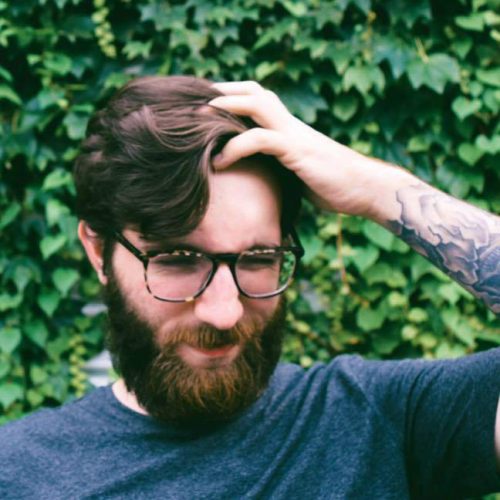Middle Kid makes complaining sound good.
Based in Frederick, Maryland, Middle Kid is both Zack Willis’ place in his family’s birth order and a project that’s something pretty close to a musical journal. And let’s be real: it’s also just a phenomenal band name.
Part of what makes the name so great is that, if you turn it into an adjective, it describes the band’s music perfectly. Take the origins of the band, which are incredibly Middle-Kid-ish: Willis had grown up around the local music scene, and he was writing songs as early as his freshman year of college, but he didn’t decide to heavily invest into his music until receiving affirmation at open mics around Frederick. Soon after, the band’s first EP was recorded in his mom’s kitchen.
It was called Whiner.
And, seriously, just listen to the band’s subsequent album titles: Yeah, Sure, and Underdog. Does it get any more Middle-Kid-ish than that?
Stylistically, Middle Kid’s sound is a clear nod to late-90’s / early-2000s emo-grunge, albeit with a few poppy vocal lines thrown into the thick crunch of electric guitars, chugging bass lines, and garage-reverbed drums. More often, though, the melodies are lonely and honest. Basically, Middle Kid’s music sounds like growing up for any suburban 90’s kid. Like Stranger Things, it’s all the better for the nostalgia it evokes. And, nostalgia aside, it also just feels real. It feels like your music.
That being said, all of this – the raw complaining, the ironic album titles, the (as Willis describes it) self-indulgent style would all be grating if the music was not also so self-aware.
It’s music that complains honestly about the monotony of life, but it’s also music that’s honest about the monotony of complaining.
In short, it’s Middle-Kid-ish music. And it’s good stuff.
Two Story Melody had the chance to talk with Willis’ about his approach to songwriting and the inspiration behind the instantly-relatable track “53rd Birthday” from the band’s Yeah, Sure EP. Spoiler alert: that track is an effort that the Frederick News Post has called “deliciously despairing and wildly poignant”, and the most “gut-wrenching story in recent local music lore.” Brace yourself.
We hope you enjoy the story behind it.
To hear more from Middle Kid (and to catch their most recent demo, Underdog), be sure to visit the band’s profiles, linked below.
Photo credits: Emily Jessee
Why do you write songs?
Willis: I write songs for the same reason most people do. The process is the only way I’ve been able to properly vent whatever emotion or thought is in my mind. Sometimes I draw on concrete experiences, sometimes more abstract ideas, but it’s always based around getting it out of my mind in a short burst.
When did you write your first song? What was it like?
The first song I ever wrote was called “High on Life” and I wrote it in my… freshman(?) year of college. It was horrible. Well, maybe not HORRIBLE, but the lyrics were pretty embarrassing (just look at the title to confirm that…), and the chord progression was pretty barebones. While I still lean heavily on repetition for my music, it’s not as bad as this song was. I will say that the vocal melody was catchy. I like to think I have a fairly good ear for catchy vocal melodies.
What do you think makes a song “good”?
Lots of things! There are good songs in every single genre of music, whether I like the song itself or not. In my mind, the best songs are the ones that aren’t analyzing musical trends and trying to make the exact song they think you want to hear. The best songs are the ones that allow you to truly understand what the artist is about. Pure 100% uncompromised vision. I love that. However, I also just think that any song that you listen to and enjoy is inherently a good song.
Who is your biggest musical influence – and how do they influence the way you make music?
My musical influences are rooted around Kevin Devine, the first Foo Fighters album, and 50s/60s Soul music.
The self-titled first Foo Fighters record is my favorite record on this planet, no debate. It’s super catchy, the fuzziness and rawness is unbeatable, and the lyrics make almost no sense. I’ve been listening to that record since my childhood and I still pick up new things every time.
Kevin Devine is one of my favorite lyricists and songwriters of all time. His lyrics are beautiful works of poetry that are incredibly descriptive and yet generally minimal. It’s what I strive to write but seldom can. His songs follow the same edge as Nirvana or the Pixies, I.E. the “quiet-loud” dynamic. I use that a ton.
50s/60s Soul music gives me everything from the catchiest vocal melodies to the most important chord progressions, but what I take the most from it is the ethos of never playing the same song twice. Though I have the music recorded one way, I try to add things into the live performances, whether that manifests itself in extra notes on the guitar or louder screams in my singing, the energy of the room and the intensity I’m feeling in the moment will always dictate the sound. I never strive to be perfect, only to be honest.
How would you describe your music?
Straight-forward. Some of the lyrics can be a little flowery and abstract, but for the most part the meanings are gleaned pretty easily. I’ve always preferred to be more up front about things in my everyday life, so I think that carries over into the music as well. If you listen to most of my songs, the guitar usually uses the same couple chords getting louder and softer as necessary. It’s never a matter of putting in excessive solos or TOO many effects (though I do love effects). My rule of songwriting is to say what I need to say and get out. I never want to overstay my welcome. This is also true in life.
What would be the “best” effect that your songs could have – on you or your audience?
For me, the songs are therapeutic. So if I can get through something by writing, I’m happy. For the audience, those things remain true, but I also think I want my songs to communicate the idea that anyone can do this. You can play these songs; you can write these songs. Start a band and let’s play shows together. If that’s what you want to do and something is holding you back, pop in this record, and know that it’s me saying that you can absolutely do this and I would love to help.
When you’re writing a song, how much focus are you putting on your intended audience?
None at all! I’m not even 100% sure I have an intended audience. The people that have given me attention are all across the board right now, which is something I appreciate. I think that as I refine my work a little more and release more, my general audience will become slightly more apparent, but I’ve always felt like the best work you can do is honest work, and to me, honest work doesn’t come from trying to write what people want to hear.
When you’re writing, which comes first – the idea and lyrics, or the music?
It varies heavily. “Black Out” was written as an ekphrastic poem first, then adapted to music when I realized its melodic potential. “Underdog” was written from the guitar melody first. I think generally the melody comes first then the lyrics, but it can totally vary.
Do you care more about how your songs sound, or about the words you’re singing?
I’ve thrown away plenty of solid guitar melodies because I was unable to get bad lyrics out of my head. I have generally found that when the lyrics are good, I can write and rewrite music around them with very little effort. So I think words are more important, but I certainly care about both of them equally. The music needs to perfectly complement the words or the whole thing falls apart.
How do you create the vocal melodies for your songs?
I try to avoid directly following the guitar melody I’m writing when coming up with vocal melodies, but sometimes it’s inevitable! In almost every situation, the vocal melody has just come to me. I don’t spend a lot of time thinking about the vocal melody at all, rather, I tend to hum along to the guitar and plug in words to whatever vocal melody I came up with.
Would you rather write by yourself or collaborate with a band?
Some of the best ideas that have made their way into Middle Kid songs were with a band. Right now I’m doing all my writing by myself, and can get frustrating simply from not knowing how to incorporate other instruments (I don’t play drums and barely play bass), but it generally works out. I think both ways have places in the process.
When you sit down to write a song, where do you start?
Most of the time I’ll start with a guitar melody I’ve been messing around with and go from there. I have, in the past, come up with lyrics first and tried to build a song around that, but for the most part it’s guitar first and everything else after that.
What was the first part of 53rd Birthday to be written? (the lyrics, a melody part, an instrumental part, etc.)
It’s honestly been enough time now that I’m not positive I remember. I want to say the chords came first. Pretty sure that’s true.
How long did it take you to write 53rd Birthday? How long does it usually take you to write a song?
Generally speaking, none of my songs have taken THAT long to write. 53rd Birthday was slightly different because I had two verses and the chorus, but I had no idea where I wanted to go with it after that. It took awhile to figure that out. Most songs I’ll have pretty much done within the day I come up with them. It’s important to me to try to bottle that inspiration as quickly as I can.
What’s the central idea behind the song?
That song is really based around this one specific scene in the movie “Boyhood,” and how I projected into a greater theme. In the scene, Patricia Arquette’s character is sitting on the floor crying and she looks up at her son and says, “I thought there would be more.” It’s absolutely heartbreaking. But it got me thinking about this idea that the life of our parents is something we tend to see as one that revolves around us, the children. As a result, we’re offended when Patricia Arquette’s character looks at the child she brought into this world and says that’s not enough, but in reality, it’s totally understandable. Our parents are just as much people as we are, complete with their flaws and desires. So I think what this song comes down to is that feeling that we have when our parent reveals one of these flaws or tries to do something that doesn’t revolve around us, and how we can take that super personally and let it sour our opinion of them. Ultimately though, the song comes to terms with the fact that holding a grudge is simply the worst way to go about any situation.
Is the song more of a question or an answer?
I would say it’s both, honestly. It asks a question, “Are you my enemy?,” and by the final verse that question is answered in a resounding “no.” No, you aren’t my enemy. I should’ve been there, I should’ve called.
How did you know when the song was finished?
I knew I wanted a fairly simple setup with this song, and two verses just really did not feel like enough at all. So with the addition of the third verse and placements of the choruses, that seemed like enough. The third verse, I think, really wraps up the entire story/idea in a concise way.
What do you want listeners to take away from the song?
Sometimes things aren’t as big as they seem, and most of the time those things aren’t about you. The statement, “I thought there’d be more,” is something that could truly offend you, but if you stop for a minute and put your own feelings aside, you begin to realize that they were never trying to push you out, rather, it was never about you to begin with. I guess the song is just about trying to empathize with other people. Don’t let it take a decade to figure it out.
Best advice for other songwriters?
I follow a few rules that I try to adhere to. First, always be emotionally truthful. If you aren’t happy, don’t try to write a happy song. It just comes out insincere. Second, if you start writing something, finish it. Even if you hate it, you can try to work out the reasons why you hate it and use those lessons in future songs. Third, some of the best writers I’ve ever seen were also voracious readers. Try to read at least a little bit every day. I don’t do that as much as I should, but it’s certainly a good lesson.









